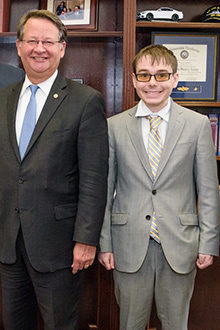Letter from Washington: Nick Panourgias, ’17, on His Senate Internship
January 30, 2017

Nick Panourgias (right) with U.S. Senator Gary Peters of Michigan.
Nick Panourgias, ’17, a senior from Birmingham, Michigan, is majoring in political science with a concentration in the Gerald R. Ford Institute for Leadership in Public Policy and Service. He is also a member of the Prentiss M. Brown Honors Program, and wrote the following toward the end of his fall 2016 internship.
Working in Senator Gary Peters’ office in Washington, D.C., has given me quite a few odd stories. My favorite happened just two weeks into my internship. I lost my cell phone going to a briefing on the tram that connects Senate buildings. When the car I was riding in came back, [California] Senator Barbara Boxer was in it. Normally etiquette dictates that interns don’t get on the same car as senators, but after explaining my situation Senator Boxer offered to help me look for the phone, then pointed me to the Capitol Police, who already had it, and I was able to get to my briefing on time.
A lot of my internship relates to constituent correspondence. This includes writing letters to constituents and researching topics for our legislative correspondents. I also give tours of the Capitol to Michigan constituents who visit Washington, D.C. Finally, I attend briefings on legislative topics, especially those relating to science, and write up summaries for our legislative correspondents and legislative assistants.
Writing letters starts with researching a topic, which is fairly easy because I have access to the Congressional Research Service. Still, because as an intern I mostly write on obscure topics, there may be a lack of sources on issues like energy pricing and sports broadcasting (I’ve written letters on both). I have to write in the style of Senator Peters, and writing in someone else’s style can take some getting used to. For instance, Senator Peters often likes to use short, concise sentences when explaining his position. I’ve gotten pretty good at emulating that specific style, which has also improved my general writing skill.
The second most difficult part of my work is giving tours. The Capitol building is a maze, and it is incredibly easy to get lost. When you’re being followed by constituents who assume you know the Capitol inside and out, things get awkward. I know my way around now, but it took me about a month, and I still sometimes get lost on the House side.
Giving tours also requires a large knowledge of American history and especially art history, the latter of which I was clueless about before my internship. Now I know the name and artist of almost every single piece in the Rotunda. While I am unsure of the relevance of that knowledge in my future career, it has helped me make a name for myself around the office.
I especially enjoy attending briefings, which are the congressional equivalent to guest lectures at Albion. These briefings have given me the opportunity to learn about everything from hydroelectric power to the future of space travel, and these briefings also give me an opportunity to network with people from all over the country. My favorite briefing focused on the ways colleges were promoting startup businesses and how legislation could continue to help those businesses. It also gave me an opportunity to work with interns across the country to promote awareness of business policy to students who would otherwise be uninterested with the topic.
I would have had no idea that this internship opportunity existed without the Ford Institute. Once I knew about the internship, the Ford Institute provided invaluable help with writing my application and polishing my résumé. Going back further, my advisor, [political science professor] Andrew Grossman, inspired an interest in the political process I didn’t know I had.
Before I took this internship, I had no idea what I wanted to do after graduation, but this has shed some light on a career. My ideal career path is to go to Washington, D.C., and work for the Senate. I doubt I would ever run, but working as a legislative assistant seems like a realistic five-year goal and a good way to start a great career.